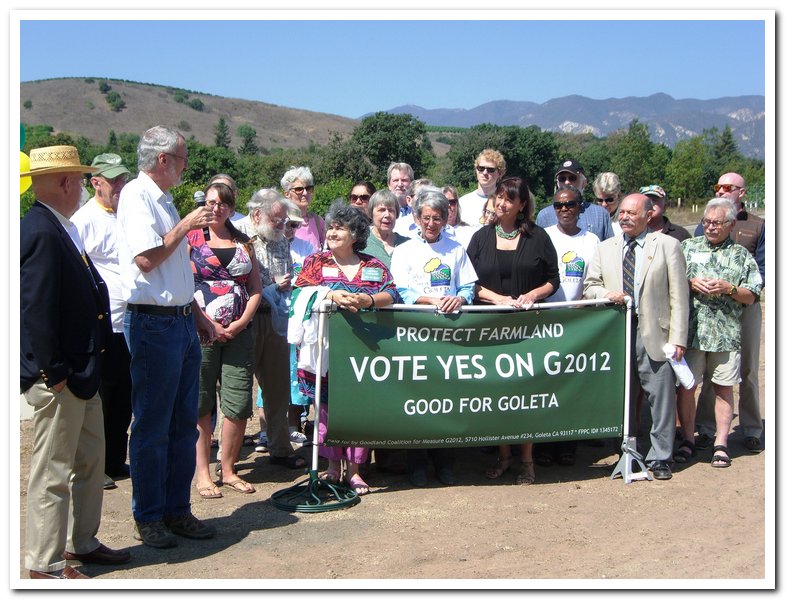G2012 Shifts Power to the People
Veto Power for Developing Ag Parcels Above 10 Acres

With approved building units in the City of Goleta piling up like river water behind a dam, on November 6 residents will vote on a new way to influence specific kinds of proposed developments. These projects must be situated on land 10 acres or more in size and currently zoned for agriculture in the city’s General Plan (GP) or in the county’s adjacent Goleta Planning Area.
The general election ballot calls it “Measure G2012” or, more formally, the Goleta Agricultural Land Protection Initiative. If the voters pass G2012 they, not the City Council, will make the final decision on whether such parcels within the city limits – six now exist, with 240-acre Bishop Ranch the largest of the lot – can be rezoned for nonagricultural use.

Changing General Plan land-use categories currently requires agreement among three of the five-member Council. The grass-roots amendment to the Plan (which if accepted by a simple majority would apply for the next 20 years) requires that once the Council approves conversion of an ag land parcel, a public vote must ratify that decision.
Likewise, a simple majority (50 percent plus one vote) can alter or rescind the ag lands amendment.
Though the Council has passed numerous developer-sponsored projects that altered the GP during the city’s initial decade, this is the first time a citizen-driven amendment has been brought to voters. By my reading, it seeks to strengthen the General Plan’s protection of open spaces and agricultural lands by adding breathing room between the municipal planning process and the legal go-ahead to break ground on Goleta’s vanishing farmlands.
“Our goal is that if ag properties have to be rezoned for another purpose, it should be the community’s vision, not the developer’s alone,” explains Robert Wignot, chair and cofounder of the Goodland Coalition. “These decisions should not depend on a single (councilmember’s) swing vote,” says the retired water manager.
It’s important for the next generation of residents to decide the future of agricultural lands, argues Richard Whited, a coalition member with a history of fighting for open spaces, like Ellwood Mesa. “I feel strongly about not developing that land now,” he says.
Those who agree with Whited got a morale boost on October 16 when lawyers for the owner of Bishop Ranch informed the city that an earlier lawsuit had been dropped and all development agreements between the owner and Bishop Ranch 2000 LLC had been “terminated.” However, this move does not prevent similar agreements with other developers, nor does it block future efforts to develop other parts of the ranch outside city limits.
Meanwhile, opponents to G2012, who have coalesced around the Goleta Valley Chamber of Commerce, have attacked the measure. They argue in the sample ballot that the initiative undermines Goleta’s General Plan, weakens the power of city officials, stifles democracy and civic engagement, and does not protect agricultural land.
Kristen Miller, the Chamber’s chief executive officer, asserted some of these positions in a phone interview, but her main complaint was that the measure upsets the perceived balance between the General Plan and the elected Council members. “The initiative is not as good as the present process,” she says.
In ballot arguments she further claims that G2012 “is nothing more than a special-interest power grab by a few who seek to undermine” the Council’s decision-making authority.
Former councilmember and mayor Eric Onnen, a small business owner, states the conflict more bluntly in a recent Noozhawk opinion piece . He maintains that the measure’s backers “are willing to sacrifice anything to prevent the possibility of growth or development.”
He argues that a host of costly negative effects will swamp the city should citizens have the power to veto a Council bent on turning cropland into residential or commercial buildings. Yet he fails to mention the 10-acre trigger on such properties or exceptions to the ban, and charges that a “small group believes it has the only solution…”
Here are the salient facts: If passed, G2012 would apply to a limited number of ag parcels of 10 acres or more within city boundaries (an estimated five or six) plus any annexed 10-acre-plus parcels from the Goleta Planning Area (perhaps up to 120). If after the project’s evaluation the Council decides to allow development, its action would be subject to voter approval.
The measure, which is no panacea, runs until December 31, 2032, and allows the Council to make exceptions for public schools and parks once certain findings have been met.
Aided by the Environmental Defense Center, the Goodland Coalition crafted the G2012 petition, recruited volunteer campaigners and, in six weeks, collected signatures from around 2,100 residents, about 500 more than needed. I see no evidence of a small, well-funded special-interest group forcing Goleta voters into development paralysis and decay.
The coalition that Bob Wignot leads is composed of young and old, local employees and retired folks, recent and long-time residents. It could use more ethnic diversity from my point of view, but it fails to fit the labels its opponents are trying to attach to it. In particular, the G2012 option empowers city voters and enhances rather than diminishes the likelihood of civic engagement.
Like most voters, I have no crystal ball foretelling the consequences of G2012. All I have are facts and logic. They lead me to welcome a bigger check on the way the Good Land is filling in, and a voice on the shape its future may take.



